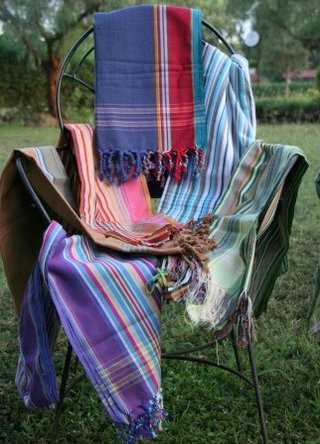Sleeping on the Danube
“There aren’t many Americans who can say they’ve slept on the
Danube,” laughed my new friend Catherine Sevier. She is an R.N., PhD,
and former Vice-President of the Diabetes Foundation. Catherine, along
with her husband David, was in charge of the Health Consultation track
for the Hope for Europe Congress II. Our little group of 42 folk (out
of the larger 1000-plus attendees) were rooming in a “botel”—a
ship-turned-hotel docked at Quay 21 on the Danube River in Budapest,
Hungary.
The 42 of us, tasked to discuss the relationship of
the church to health issues, represented 18 countries, most of them
European. Leaders represented health-related ministries such as Ukraine
Medical Outreach, Global Hope Network International, Healthcare
Christian Fellowship, International Christian Medical and Dental
Association, YWAM (Youth With a Mission) Budapest, various ministries
for drug addicts, etc.
So what was Karen Mains, with no
medical training in her background, doing in this crowd? My role was to
represent Medical Ambassadors International. I’ve served on their board
for the last year and a half.
When I was asked to visit the
Medical Ambassadors board for a “check-one-another-out” routine, I
announced to the roomful of men, “Maybe you can’t see it, but I am on
my knees begging you, begging you, to let me serve on this board!”
“That
was pretty unusual,” reported one of my new board colleagues, a couple
months later (after they had unanimously approved my acceptance).
“Usually it is we who are begging people to work with us.”
While
traveling to the International Council meeting, I found I was sitting at the board
table with a group of wonderful men. As I scrambled to get my mind
around an international organization serving in 104 countries, I
discovered a series of lesson plans titled Women’s Cycle of Life
and met Charlene McWilliams. A former public-health nurse, she had
designed the 19-lesson series. The lessons dealt with conception,
birth, menstruation, nutrition, sexual relationships, menopause and
everything in between—everything that marks the passage of earthly
feminity. Because of the philosophy of health of Medical Ambassadors,
fieldwork (preventive healthcare; training nationals to train
nationals; a holistic approach; story-telling and seamlessly
integrating Scripture into what is now over 10,000 lesson plans), the Women’s Cycle of Life lessons are designed in a learner-participatory fashion so that even illiterate woman can understand and begin to teach others.
But no one on the board had become a WCL
advocate—perhaps because they were all men dealing with the heavy
demands of raising funds for an international ministry. I immediately
sensed the potential of the Women’s Cycle of Life
material as a sample way to demonstrate to American women what Medical
Ambassadors was doing around the world. By empowering nationals to take
responsibility for their own health and well-being (preventive and
community-based healthcare), they also had become an evangelistic and a church-planting outreach.
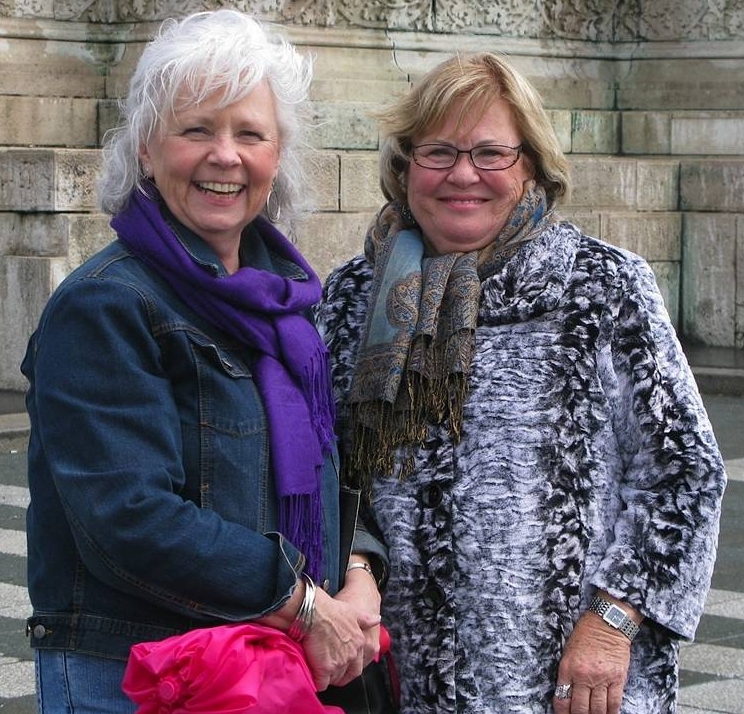 Karen & Charlene in Budapest
During
my novitiate days as a director, across the world in Ethiopia, Sharon
Abebe—a Medical Ambassador worker and an Ethiopian—trained 42 women for
a week in conference settings. Many of these African women had never
been out of their villages. They were lodged in a dormitory setting.
None of them had ever had someone else do the cooking for them. They
spent five days in intensive training and most of their nights chatting
together like college girls on retreat. Sharon stressed to them that
the purpose of this training was to train other women.
Three
months later, during verbal interviews, Sharon discovered that these 42
women had trained some 1,680 other women regarding portions of the
cycle of life.
So Charlene and I ran eight focus-groups
across the country, seeing what things worked in small-group
presentations and what things could be improved. During that time I
made a challenge presentation to the board, they all read Half the Sky
by Nicholas Kristoff and his wife Cheryl WuDunn. After the focus
groups, we designed a final home presentation, and requested and
received a development grant of $16,700 from the Medical Ambassadors
grant committee. In addition, I was asked to interview a local nurse
whose PhD has an emphasis in preventive and community-based healthcare.
I found her to be delightful, and she is now in the process of being
hired as the International Resource Director for Women’s Cycle of Life.
I’m breathless.
We are right now seeking Women’s Cycle of Life
Champions who will host home groups for this presentation, for the
purpose of making friends and raising funds. It costs about U.S. $1000
to provide transportation and room and board for a week of in-country
conferences overseas. The donations from these home presentations will
be allotted to teaching national women all over the world, training
them to train others. Think of the potential multiplicative impact of
$1000.
Since the last Medical Ambassadors board meeting in
July, the training kits for these presentations have been prepared.
Video footage has been filmed and edited for a DVD that walks the
hostess through the home event. The Women’s Cycle of Life lesson plans have been revised and printed in a spiral-bound booklet. Forty WCL
teaching toolkits have been prepared, and some shipped already around
the world. (Toolkits include a baby doll, placentas, uteri—knitted by
an 83-year-old California woman—breasts for self-examination, etc).
Charlene is currently in a South American regional conference in
Argentina, training more WCL trainers. In Kenya this last October, Winnie and Tirus Githaka, MAI East Africa directors, told of holding a WCL
training where the husbands of the women trained felt strongly that men
should also receive the training (as they should). A day-long meeting
had already been held for brainstorming what it would take to make that
possible. I plan to go back to Africa to observe training on the field
next April.
Who knows?—when you say “yes” to God in whatever
way—who knows where that will take you? You might find yourself
sleeping on the Danube, or attending a Lamaze class taught in Swahili
in Nakuru, Kenya—as I did in October with about 15 young women in
various stages of pregnancy.
Think about this: At this stage
in my life, 68 years of age (69 in January) I get to advocate, be a
cheerleader for, encourage, affirm and support a worldwide program that
has the potential to empower, bring health to and introduce Jesus to
literally hundreds of thousands of women. Given the same circumstances,
who wouldn’t be ecstatically happy and deeply, exhilaratingly grateful?
Karen Mains
NOTICESKaren Is Blogging
Check out Karen’s blogs at http://blog.karenmains.com.
Her blogs for next week include: “Fugues, Funks and Fogs," Greens by
the Side of the Road," "Shopping for Teenagers," "Using What Is at
Hand" and "The Oil Lamps Burn Bright Beside the Path."
These blogs are a daily journey of finding God in the commonplace. We Need Some Prayer Friends!
Carla
Boelkens, Director of the Global Bag Project, and Karen Mains need to
go back to Africa in April. The Global Bag Project is still at the
place where face-to-face interaction is crucial. David and Karen Mains
and Carla Boelkens have made an accumulated total of 11 trips to Kenya
and need to find the money to underwrite the April 2012 trip for the
two of us. Our out-of-pocket resource pool is depleted!
If you love us, please pray this way:
1. We
need about $3,000 each for air costs, ground expenses, and money to
invest in small projects when we are there. Pray for funds to be found.
2. We
will continue to make bag products to sell in the States, but we need
to work with our Kenyan partners to find products that will sell
locally at local prices in local markets. This helps Global Bag Project
Kenya to launch itself into sustainability. A mini-back pack made with
drawstrings is the first product we would like to develop and test. The
next effort would be to set up meetings with the voluntourism industry
that is developing in-country in Kenya. What could the Kenyan sewers
make that tourists could buy from hotel shops, resort centers, more
up-scale travel markets that shout “This hotel is helping local women
become entrepreneurs!”? Pray that we will find ideas to make GBP Kenya
sustainable.
3. We need to find investors
who will underwrite the development of new bag products. When in Kenya
in October, Karen’s friend Pam Klein helped the sewing room women at
Africa International University design a gorgeous wraparound skirt
(with its own travel bag). We would like to order 100 more skirts but
we don’t have the funds to do this. We need investors
(who understand that their dividends and returns will be changed lives)
to help us underwrite the start up costs to make these products.
“Investments” totaling $1000 would get the women started (and of
course, these will be tax-deductible).
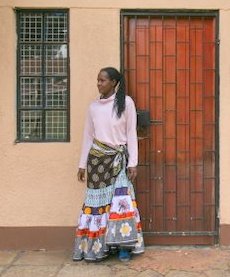
Salome modeling a wraparound skirt
While
shopping in the Somali wholesale fabric markets (that is an incredible
experience, believe me), my friend Pam noticed beautiful kikoi
cloth, another typical East African fabric—we have been using kanga
designs for our reusable shopping bags. Purchasing some bolts, she took
them back to the sewing room and ordered pillow “bags” for her denim
couch in the television room. We realized that Pam had just capitalized
the start up of a new “bag” product line.
Kikoi cloth Pray
for us, if you love us, that we will God will help us find investors
who provide the funds so we can develop new bag products to sell here
and in Africa. Right now, we have no resources for new product development.
Christmas
“investments” and end-of-year gifts can be given to Global Bag Project
and mailed to Box 30/ Wheaton, IL 60187. Receipts for 2011 will be
returned in time for January tax accounting. Voluntourism Trip to Kenya in 2012The
Global Bag Project will be sponsoring a voluntourism (working and
tourisim combined) trip to Kenya in October 2012. Right now, depending
upon the general Kenyan election, we are planning to travel the first
two weeks in October.
We will be “flipping” some of the
seamstresses’ houses, shopping in the markets for fabrics for them to
make new products from, and renovating some rooms in the Kijiji Guest
House (where we will be staying) on the campus of Africa International
University. Guests who stay on campus often become customers, moving
the GBP sewing room there toward profitability. While we are in Africa,
we want to help find products that guests will buy and take home with
them: age-appropriate toy bags for boys and girls made out of east
African fabrics (just in case you haven’t had time to go shopping).
We
will go to church at Nairobi Chapel, shop in the Arab markets, have
lunch at one of the older tea farms, visit the Rift Valley and take
English tea at Lake Navaisha Country Club (a throwback to English
colonialism), examine some development projects with a proven history
of success—Kaburi Beads, the artist colony at Kitengela Glass (where
“Nothing Is Wasted”), tour Amani Ya Ju (the mother of all sewing
projects), meet the GBPK seamstresses in Kibera slum, have lunch with
the bag-makers from the sewing room at Africa International
University—all this and safari too! We will look at the Women’s Cycle
of Life, a methodology that teaches women (even illiterate women) how
to educate other women on hygiene, nutrition, the stages of menses,
sexual relationships with their husbands, birth and post-natal care—all
of which is seamlessly integrated with Scripture lessons. We will ask
you to tangle with some of the dilemmas that keep helpless people
helpless and see if we can actually provide solutions
We promise that you will never think of the world the same after this journey.
The
land cost will be $3500 ($500 of this will be a donation to Global Bag
Project Kenya and you will get to choose how to spend it in Africa!).
More
details to follow, but we will need a deposit of $500 and your
registration by April 2012. At that time we will begin our journey
through a series of monthly getting-to-know-each-other and cultural training conference calls. These will begin in May. We recommend that people read: • When Helping Hurts by Steve Corbett, Brian Fikkert, John Perkins.
• Half the Sky: Turning Oppression Into Opportunity for Women Worldwide by Nicholas D. Kristoff and Sheryl WuDunn.
• The Blue Sweater: Bridging the Gap Between Rich and Poor in an Interconnected World by Jacqueline Novogratz.
• Out of Africa by Karen Blixen.
• Africa Friends and Money Matters by David Maranz.
• Infidel by Ayaan Hirsi Ali.
Some of these books will be topics of our conference-call book discussions.
Registration
will be open January 2012. At that time we will have final details. But
if you want to go, you might want to ask for financial gifts to help
underwrite the journey.
Do the math: $3500 (not counting
airfare, which was about $1600 this October) divided by 10 months would
mean you would need to put aside $350 each month to have a travel money
fund by October 2012. Please come. We would love to share this
remarkable experience with our friends.
Reminder!
The Soulish Food e-mails are
being
posted biweekly on the Hungry Souls Web
site. Newcomers can look that over and decide if they want to
register on the Web site to receive the biweekly newsletter. You might
want to recommend this to friends also. They can go to www.HungrySouls.org.
|
|
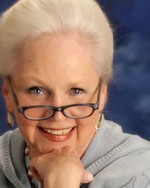
Karen Mains
“Who knows?—when you
say “yes” to God in whatever way—who knows where that will take you?
You might find yourself sleeping on the Danube, or attending a Lamaze
class taught in Swahili in Nakuru, Kenya—as I did in October with about
15 young women in various stages of pregnancy.”
BOOK CORNER
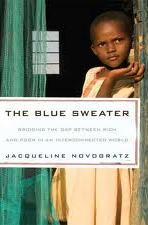
The Blue Sweater: Bridging the Gap Between Rich and Poor in an Interconnected World
by by Jacqueline Novogratz
This
is a wonderful book for any of us who want to make a difference for
good in the world. If you give to a development organization, support
overseas workers or are involved in any kind of social entrepreneurship
efforts—microenterprise, microcredit loans, water projects overseas,
etc.—this is a must read. It is a handbook that looks at the mistakes
and lessons learned from the failures of well-meaning people and
governments. Novogratz eventually leveraged her twenty years of
mistakes and successes into the Acumen Fund, a nonprofit venture
capital firm for the poor that invests in sustainable enterprises
bringing healthcare, safe water, alternative energy and housing to
low-income people in the developing world.
The flap copy
explains: “Jacqueline Novogratz left a career in international banking
to spend her life on a quest to understand global poverty and find
powerful new was of tackling it. It all started back home in Virginia,
with the blue sweater, a gift that quickly became her prized
possession—until the day she outgrew it and gave it away to Goodwill.
Eleven years later in Africa, she spotted a young boy wearing that very
sweater, with her name still on the tab inside. That the sweater had
made its trek all the way to Rwanda was ample evidence, she thought, of
how we are all connected, how our actions—and inaction—touch people
every day across the globe, people we may never know or meet.”
While
reading, I highlighted extensively, knowing that I was sitting at the
feet of someone who could help me bridge my own eager, but potentially
misguided, desires to find ways to help the poor help themselves. My
pages, marked by yellow, are an indicator of how valuable I found this
book to be.
Buy From Amazon.com »
|

